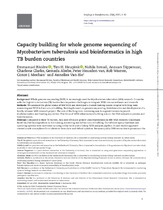| dc.identifier.citation | Emmanuel Rivière, Tim H Heupink, Nabila Ismail, Anzaan Dippenaar, Charlene Clarke, Gemeda Abebe, Peter Heusden, Rob Warren, Conor J Meehan, Annelies Van Rie, Capacity building for whole genome sequencing of Mycobacterium tuberculosis and bioinformatics in high TB burden countries, Briefings in Bioinformatics, Volume 22, Issue 4, July 2021, bbaa246, https://doi.org/10.1093/bib/bbaa246 | en_US |
| dc.description.abstract | Background
Whole-genome sequencing (WGS) is increasingly used for Mycobacterium tuberculosis (Mtb) research. Countries with the highest tuberculosis (TB) burden face important challenges to integrate WGS into surveillance and research.
Methods
We assessed the global status of Mtb WGS and developed a 3-week training course coupled with long-term mentoring and WGS infrastructure building. Training focused on genome sequencing, bioinformatics and development of a locally relevant WGS research project. The aim of the long-term mentoring was to support trainees in project implementation and funding acquisition. The focus of WGS infrastructure building was on the DNA extraction process and bioinformatics.
Findings
Compared to their TB burden, Asia and Africa are grossly underrepresented in Mtb WGS research. Challenges faced resulted in adaptations to the training, mentoring and infrastructure building. Out-of-date laptop hardware and operating systems were overcome by using online tools and a Galaxy WGS analysis pipeline. A case studies approach created a safe atmosphere for students to formulate and defend opinions. Because quality DNA extraction is paramount for WGS, a biosafety level 3 and general laboratory skill training session were added, use of commercial DNA extraction kits was introduced and a 2-week training in a highly equipped laboratory was combined with a 1-week training in the local setting.
Interpretation
By developing and sharing the components of and experiences with a sequencing and bioinformatics training program, we hope to stimulate capacity building programs for Mtb WGS and empower high-burden countries to play an important role in WGS-based TB surveillance and research. | en_US |

